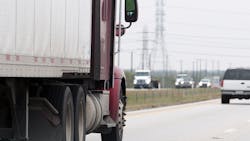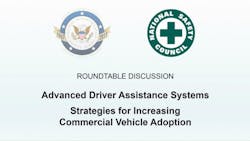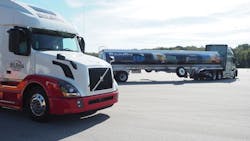During a broadly represented roundtable discussion this week on advanced driver assistance systems, or ADAS, in heavy trucks, a question came up that's likely to need answering: What can you do — or will you permit being done — with the data from those systems?
ADAS technologies such as autonomous/ automatic emergency braking are expected to be the groundwork components of the much-trumpeted self-driving vehicles of the future. ADAS data, industry stakeholders said, could help inform policymakers' decisions on regulation, incentives or other actions going forward.
Weighing in, among others, were representatives from a carrier fleet, a truck maker, an automotive safety advocacy group, university researchers, and rounding it out, an ADAS technology company as well.
"We are very interested in how these systems work, what are the most effective ways of introducing the systems, etc. Who owns the data now? How does it get shared? Is is possible to share that?" said Alex Epstein, senior director of digital strategy and content at NSC, setting up the segment. "Is it possible to find out in an anonymous way what is happening inside an individual truck, or inside an individual safety feature, if a crash occurs?"
Fleet take
Representatives from truckload carrier Schneider National, Inc. and crude oil hauler Sentinel Transportation were strongly supportive of ADAS technologies and their potential to cut down on heavy truck accidents and earn fleets a return on investment, often by avoiding collision-related legal fees and payouts.
But the larger theme of the discussion was these systems' ability to save lives and increase safety for everyone on the road. Thomas DiSalvi, vice president of safety and loss prevention at Schneider, said the company has installed a number of driver assistive technologies in its trucks, including automatic emergency braking about five years ago.
DeSalvi added that Schneider has shared other data such as from electronic logging devices and sleep apnea testing to help inform regulatory and other government officials, and said the company would be willing to do the same in this case with ADAS. "It is possible to get that [data], and we're talking both in an aggregate and a truck-specific application," he said.
He stressed that the data would have to be aggregated and/or anonymized, but noted that "in terms of support, there is certainly carrier support to advance this technology."
Concerns
Tim Lafon, vice president of regulatory affairs at Volvo Group North America, agreed that ADAS information can be valuable, but stepped back and left the data-sharing decision as the fleet's prerogative. Volvo Trucks recently made Volvo Active Driver Assist — the OEM's integrated version of the Bendix Wingman Fusion radar- and video-based collision mitigation system — standard equipment on its new VNR and VNL series tractors.
"Obviously, there are public concerns about releasing data and information. The way we treat it is, that data is owned by the owner of the vehicle," he said at the roundtable.
"There is a lot of good information there that we use in crash investigations," Lafon added, while also underscoring that "we can't use that alone — we have to collect information from the accident site, witnesses and so forth."
'Not going to happen'
Shaun Kildare, research director at Advocates for Highway and Auto Safety, approached ADAS data with a view of the future and moving toward self-driving vehicles. He contended that the trucking and automotive industries and policymakers "need to take another look at" electronic data recorders — "black boxes" like those found on planes — for commercial and passenger vehicles.
"As we start transitioning to those higher levels of autonomy, we're going to want to know — everyone's going to want to know — what that vehicle's decision-making was, and why it decided to do whatever it did before that collision happened," Kildare said.
Part of the "we" he referred to was researchers, manufacturers, insurers and others who will be looking at ADAS data as these systems are refined and developed going forward. But the other part is the general public, among whom there is often deep mistrust of vehicles taking over and intervening, and certainly the prospect of driving themselves.
"We have a much lower tolerance for a machine screwing up than we do for a human being screwing up," Kildare pointed out. "To assume that people aren't going to want to know what that machine was doing when it was driving them around and got into an accident or crashed, that's not going to happen."
'Unknowable'
Whether or not the public distrusts the machines and active safety systems as ADAS technologies advance and essentially become vehicle autopilot systems, it may not be possible to have every question answered or fully explain every problem that occurs.
So suggested Kevin Grove, a researcher at the Virginia Tech Transportation Institute's Center for Truck and Bus Safety. The center has studied drivers' real-world experiences with ADAS.
"It's a very fundamental issue with acceptance," he contended. "Some types of machine learning that may go into the decision-making for ADAS or other types of technology — such as higher levels of automation — it's almost unknowable how the machine arrived at the decision it did arrive at."
That may not sit well with a suspicious — and litigious — public, but Grove emphasized that it simply may not always be possible to unravel the data trail in the event that highly automated vehicles crash or don't perform as their makers intended.
"It may just come down to, 'We have to accept the decision-making of the system, and how it arrived at that decision is unknowable,'" Grove said. "It will be an acceptance issue with this and other autonomous technologies."
More needed
Fred Andersky, director of customer solutions and marketing at ADAS and brake technology maker Bendix Commercial Vehicle Systems, explained that Bendix's view of ADAS data is similar to Volvo's in that it's up to the fleet or vehicle owner. He pointed to another large function of ADAS data: analytics and driver training.
These systems usually include analytic applications that communicate information from a truck to the back office so that, for example, fleet managers can monitor for problem behaviors like speeding or following too closely setting off ADAS. The systems are engineered for that, but they're not necessarily designed to be black boxes, Andersky contended.
"It's important to remember that a lot of times, this data is not designed for accident reconstruction purposes," he said. Rather, ADAS data is meant to show things like if the system was working or there was some fault.
"There's a lot that goes into the dynamics of a crash," Andersky noted, "and there's a lot that goes into understanding those implications, and it's not necessarily captured by the system." Moreover, in a truck crash, a fire, power loss or equipment damage can mean ADAS data will be lost.
Even so, Andersky agreed that ADAS data has a role in the march toward more advanced, highly automated vehicles. "There is the need, I believe, to get to having that information secured and ready — and collecting more than just basic data from system to system," he said.
About the Author
Aaron Marsh
Aaron Marsh is a former senior editor of FleetOwner, who wrote for the publication from 2015 to 2019.


